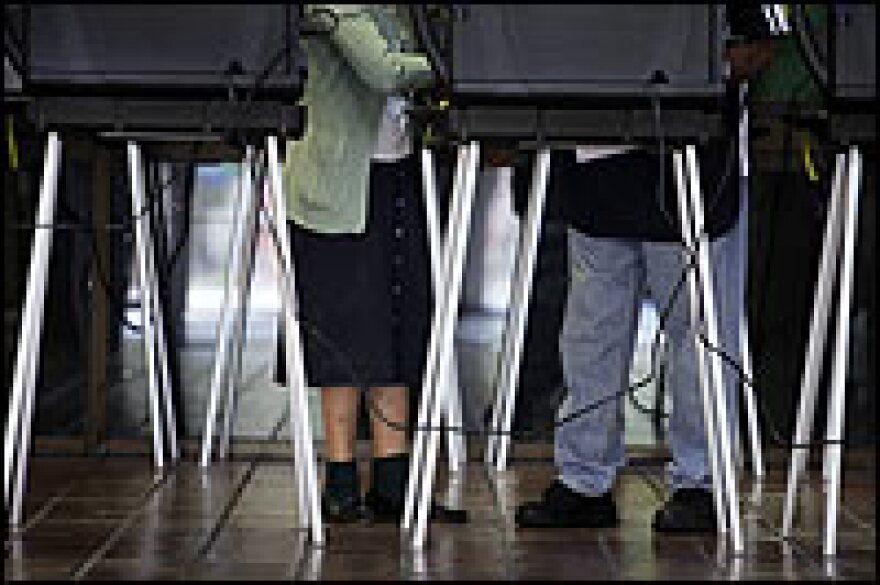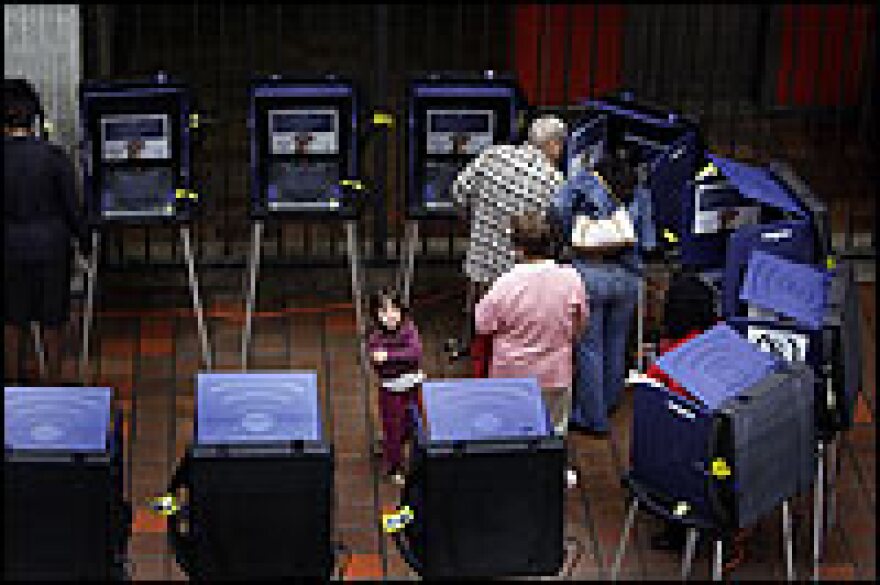

Only a few primaries and caucuses have been held so far this year, but questions are already being raised about the reliability of voting equipment.
In New Hampshire, two candidates have asked for a recount of optically scanned ballots. And in South Carolina last weekend, some voting machines didn't start up on time. Both these incidents have activists worried, especially with more than half the states preparing to vote in the next two weeks.
Teams of counters this past week have been sorting through ballots cast in New Hampshire's Jan. 8 primary. Then-Democratic candidate Dennis Kucinich asked for a recount because of suspicions that optically scanned ballots unfairly favored Hillary Clinton. Barack Obama did better in precincts where the ballots were counted by hand.
The partial recount, which ended Wednesday, has uncovered no major problems in the original tally. But it did illustrate one thing — there were actual ballots to count.
"The good news is that in New Hampshire, there's a verifiable voting system," says New Jersey Democratic congressman Rush Holt. Holt has been trying for years to get a bill passed that would require some form of paper ballots on all voting machines. He has just introduced "emergency" legislation to give federal funds to any jurisdiction that changes to a paper-backed system by November.
"Unless we act, you can be sure there will be some doubt in some counties or states this year about the federal election results," he says.
As if on cue, South Carolina's Republican presidential primary last weekend raised new concerns. In Horry County, which includes Myrtle Beach, election workers were unable to get about 80 percent of the touch-screen machines running on time. Many voters had to use emergency paper ballots. And some were told to come back later when the paper ballots ran out.
This set off a buzz in the blogosphere, where suspicions about electronic voting are strong. But Chris Whitmire, a spokesman for the State Election Commission, says the problems were traced to people, not the equipment.
"Any voting system is dependent on its user following the proper operating procedures and, in this case, Horry County election officials missed a step," he says. That step was closing out tests performed on the machines before the elections, which left some test votes still recorded and any affected machine locked up.
"It won't let itself be opened on Election Day. And it's really a good thing. We don't want the voting machine to allow itself to be opened with votes already on it," he adds.
Whitmire says the problem was compounded when poll workers told voters to come back later in the day, even though they were supposed to let voters use any available piece of paper once the official ballots were gone. He says the state is trying to make sure these problems aren't repeated this coming Saturday, when Democrats hold their primary.
But the incident has led to fresh calls for the state to replace its voting machines, which are the same ones used in Sarasota County, Fla., in November 2006. That's when the machines were used in a contentious congressional race. There's still a dispute over why 18,000 ballots there showed no votes for either candidate.
Warren Stewart is with Verified Voting, a group pushing for paper ballots. He notes that several states voting Feb. 5 — such as Georgia and New Jersey — will also use voting machines without a paper backup.
"If there's questions, or a razor-thin margin, and there's some issues that need to be resolved, there's really no way to resolve them," he says.
But most election officials say they do have confidence in the machines — that voters find them easy to use and there's no evidence anyone has ever manipulated one to change a vote. In fact, many officials think touch-screen voting is more reliable than paper, which can be lost or damaged. But they're resigned to the fact that many voting systems will be changing in the coming year.
"The security issues, while they're important, I think have been kind of blown out of proportion," says Ken Baird, who oversees elections in Kings County, Calif. "But at the same time, if these systems have been portrayed so negatively that voters have no confidence in the systems, then it may be time to move on to something else."
So on Feb. 5, his county, like many others in California and elsewhere, is reluctantly abandoning electronic voting machines and returning to paper.
Copyright 2023 NPR. To see more, visit https://www.npr.org.


